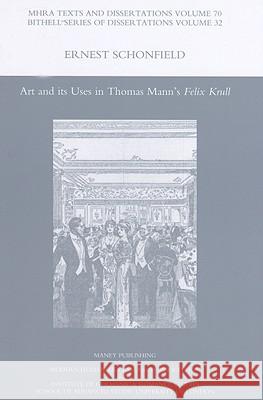Art and Its Uses in Thomas Mann's 'Felix Krull' » książka
Art and Its Uses in Thomas Mann's 'Felix Krull'
ISBN-13: 9781905981052 / Angielski / Twarda / 2008 / 210 str.
The turn of the twentieth century was a time of identity crisis for the upper and middle classes, one in which increased social mobility caused the blurring of traditional boundaries and created a need for reference works such as the British Who's Who (1897). At the same time, the rise of a new leisure industry and an increase in international travel led to a boom period for confidence men, who frequently operated in hotels and holiday resorts. Thomas Mann's Felix Krull, written between 1910-13 and continued (though never completed) in 1951-54, uses contemporary accounts of these figures as a starting-point from which to explore the aesthetics of society. The early Krull marks an important stage in Mann's development in a number of respects. In writing it, Mann acquired a more flexible conception of identity and a new understanding of the relation between artist and public.











